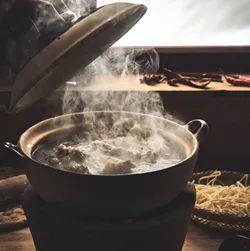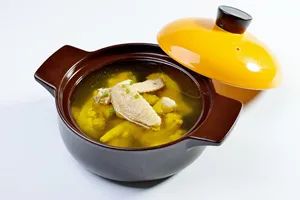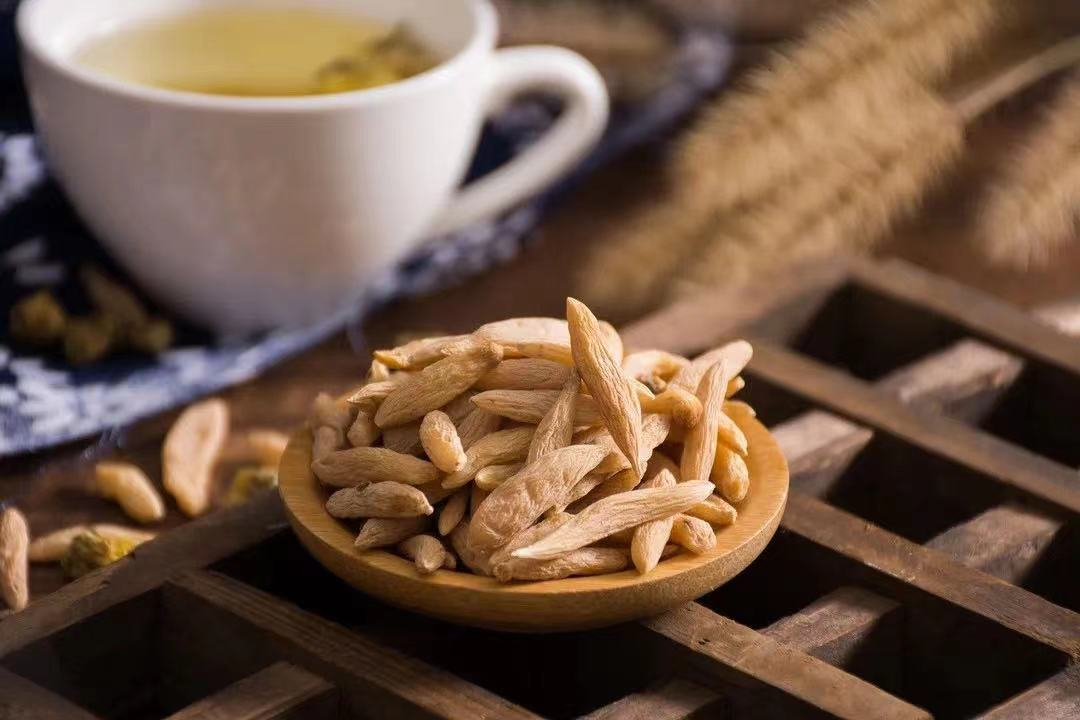
After the beginning of winter, as the temperature drops, some people often feel a dull pain in their abdomen, and in severe cases, they may even experience diarrhea. Especially in the morning, as soon as they are exposed to cold wind, symptoms of abdominal pain and diarrhea may appear.
Dr. Zhang Beiping, a chief physician at Guangdong Provincial Hospital of Traditional Chinese Medicine, indicates that the above situation may be caused by “Spleen and Stomach Deficiency Cold”.
1. What are the symptoms of Spleen and Stomach Deficiency Cold?
Traditional Chinese Medicine (TCM) believes that the spleen and stomach are responsible for the digestion and transformation of food and are the source of qi and blood production. If there is deficiency cold in the spleen and stomach, the following symptoms may manifest:
● Preference for warm foods and drinking hot water;
● Dull abdominal pain that improves with massage or heat application;
● Sensitivity to cold in the abdomen, with cold weather easily causing cold hands and feet;
● Frequent loose stools, especially after consuming raw, cold foods or exposure to cold wind;
● Poor appetite and easy fatigue.
2. How to nourish Spleen and Stomach Deficiency Cold in winter

1. Dietary Recommendations
(1) Avoid raw and cold foods. Raw and cold foods can harm the body’s yang energy. Those with Spleen and Stomach Deficiency Cold should avoid eating bitter melon, winter melon, mung beans, lettuce, and other cold-natured foods, and should not consume cold drinks or ice cream.
(2) Consume warm-natured foods appropriately. In winter, yang energy is stored, so it is advisable to eat warm-natured foods to warm the yang and dispel cold, such as lamb, yellow eel, leeks, longan, ginger, pepper, and Sichuan pepper.
It is important to note that individuals with Spleen and Stomach Deficiency Cold have poor digestive capacity. If they consume a large amount of warm-natured foods in a short period, it may lead to food stagnation, resulting in what is known as “deficiency not receiving nourishment,” which can manifest as dry throat, oral ulcers, insomnia, etc.
Therefore, in terms of diet, one should pay attention to the combination of ingredients and adjust the frequency of supplementation according to individual conditions.
2. Dress appropriately and avoid wind and cold

Individuals with Spleen and Stomach Yang Deficiency should dress warmly in winter to prevent external cold evils from invading the body and damaging yang energy, especially paying attention to keeping the abdomen, neck, and lower limbs warm.
Thus, when going out, wear more layers and prepare extra clothing, avoiding the mindset of “looking stylish over being warm”.
3. Moxibustion to warm yang and dispel cold

Moxibustion can warm qi and blood and open the meridians. On one hand, it can expel internal wind, cold, and dampness, while on the other hand, it can enhance the body’s yang energy.
At home, one can perform moxibustion on points that have warming and cold-dispelling effects, such as Zhongwan (中脘), Guanyuan (关元), Qihai (气海), Shenque (神阙), Pishu (脾俞), and Zusanli (足三里).
It is worth noting that when performing moxibustion in winter, ensure good air circulation while keeping warm, and avoid moxibustion directly in front of a draft.
3. Recommended Dietary Therapy
1. Ginger Date Tea

Ingredients:15g fresh ginger, 3 red dates, appropriate amount of brown sugar. (Serves 1)
Method:Remove the pits from the red dates and break them open, cut the ginger into pieces, add to a pot with water, bring to a boil, then add brown sugar to dissolve.
Suitable for:Individuals with Spleen and Stomach Deficiency Cold and blood stasis due to cold. Common symptoms include dull abdominal pain, pain triggered by cold, dysmenorrhea, scanty menstruation with clots, loose stools, cold hands and feet, fatigue, pale complexion, and dark lips.
2. Lamb, Sugarcane, and Water Chestnut Soup

Ingredients:250g lamb, 50g water chestnut, 100g black-skinned sugarcane, 10g angelica, 6 slices of ginger, appropriate amount of salt and cooking wine.
Method:Clean the lamb, cut into pieces, blanch in boiling water, then mix with salt, ginger slices, and cooking wine, marinate for 10 minutes; peel and clean the water chestnut, cut into pieces; clean the sugarcane; clean the angelica; place all prepared ingredients in a clay pot, add appropriate water, bring to a boil over high heat, then simmer for 1.5 hours.
Suitable for:Individuals with Spleen and Stomach Deficiency Cold, commonly experiencing cold sensitivity in the abdomen and cold hands and feet. This soup has the effects of warming the middle, dispelling cold, and tonifying qi and blood, and it nourishes without causing dryness.
3. Pepper and Pig Stomach Chicken Soup

Ingredients:1 pig stomach, 1 chicken, 35g white pepper, appropriate amount of ginger slices, 1 piece of codonopsis, 3-4 slices of angelica, 5-6 slices of astragalus.
Method:Clean the pig stomach and chicken, blanch with cooking wine and pepper until cooked, then stuff the chicken into the pig stomach, place in cold water, add remaining herbs, bring to a boil, then simmer for 1-2 hours. After cooking, cut the pig stomach and chicken into strips, return to the soup, bring to a boil, and season with salt and pepper.
Suitable for:This dish contains herbs that dispel wind and cold, warm the stomach, and strengthen the spleen, making it suitable for individuals with Spleen and Stomach Deficiency Cold, commonly experiencing cold sensitivity in the abdomen and diarrhea from eating raw or cold foods.
4. Ginger Juice Sweet Milk

Ingredients:150-200ml fresh milk, 1 small spoon of ginger juice, a little white sugar.
Method:Place all ingredients in a clay pot and steam in water. Alternatively, you can use 2 slices of ginger instead of ginger juice, and remove the ginger slices after steaming.
Ginger juice sweet milk has the effects of dispelling cold, harmonizing the stomach, and stopping vomiting. This method is particularly suitable for treating cold-type stomach pain, vomiting, esophageal obstruction (esophageal cancer), and acid reflux. It is especially suitable for middle-aged and elderly individuals with Spleen and Stomach Deficiency Cold in winter.
Ginger is pungent and warm in nature, entering the stomach, spleen, and lung meridians, with functions of dispelling cold, stopping vomiting, and opening the appetite. According to the “Food Therapy Materia Medica,” it “stops counterflow, disperses irritability, and opens the appetite.” Therefore, ginger is most suitable for treating wind-cold type colds, headaches, vomiting, abdominal pain, and diarrhea in winter.
Milk has the effects of nourishing deficiencies, benefiting the lungs and stomach, and generating fluids to moisten dryness, commonly used for weakness and fatigue as well as esophageal obstruction (esophageal cancer). The combination of ginger and milk has a long history. As early as the Tang Dynasty, the “Qianjin Food Therapy” recorded that milk “combined with ginger and scallions stops children from vomiting milk.”
4. Other Uses of Ginger in Winter
For external wind-cold, use ginger and mugwort water for bathing
Professor Liu Youzhang from the First Affiliated Hospital of Guangzhou University of Chinese Medicine explains that in winter, as yang energy declines, people are more susceptible to wind and cold, which is why many people catch colds, fevers, or suffer from other upper respiratory diseases when cold air arrives. Ginger has the effect of dispelling wind and cold, and it has the characteristic of “moving without being retained,” meaning it can disperse cold without causing dryness.
If you feel cold after returning from outside, you might consider drinking ginger and brown sugar water, or boiling 200g of ginger with 200g of mugwort to make a large pot of water for bathing. After bathing, dry your body and cover yourself with a blanket for a while, and the cold will quickly dissipate.
To awaken the stomach and relieve stagnation, use ginger with rice
Ginger also has the effect of awakening the stomach and relieving stagnation. As the year-end approaches, professionals often have many social gatherings, where meals are dominated by rich and greasy foods, leading to feelings of indigestion and loss of appetite. In this case, ginger can be helpful. Cut ginger into strips, mix with salt, and eat it with rice to awaken the stomach and relieve stagnation.
Professor Liu Youzhang mentions that when dining out, he often requests the kitchen to prepare “ginger salt rice” for himself.
To warm and tonify the spleen and stomach, use ginger to stew yellow beef
Many office workers, due to their love for air conditioning or excessive consumption of cold drinks in summer, develop Spleen and Stomach Deficiency Cold. Symptoms include pain triggered by cold weather, consumption of frozen or raw foods, cold hands and feet, and easy fatigue.For this group of people, Professor Liu Youzhang recommends regularly consuming ginger-stewed yellow beef or ginger lamb soup.
The specific method for ginger-stewed yellow beef is to cut 200g of yellow beef into strips, add 100g of ginger, and stew in a clay pot until cooked. For ginger lamb soup, use 250g of lamb and 100g of ginger, stir-fry in peanut oil until half-cooked, then add water and stew for about 40 minutes.
To dispel stomach cold, regularly consume dried ginger
Dried ginger, made from sun-dried ginger, has slightly different medicinal properties than fresh ginger. Many office workers experience stomach cold, often feeling cool in the stomach, and may even experience pain.
This condition is suitable for consuming dried ginger, which has the effects of warming the stomach, dispelling cold, and nourishing the spleen and stomach. Professor Liu Youzhang suggests that this group of people can also take some Li Zhong Wan or ask a TCM practitioner to prescribe Li Zhong Tang, both of which contain dried ginger.
Reminder
Ginger soup may cause constipation; add Ophiopogon

Some individuals with Spleen and Stomach Deficiency Cold may experience constipation after consuming ginger or ginger soup. Professor Liu Youzhang analyzes that this may also be due to insufficient yin fluids, and suggests adding 10g of Ophiopogon when making ginger soup to nourish yin fluids and reduce the drying effect of ginger.
If constipation is caused by blood deficiency, you can use 10g of angelica with 15g of ginger to stew half a pig’s trotter.
Individuals with yin deficiency and excess internal heat should eat less ginger
While ginger is beneficial, it is not suitable for everyone. Professor Liu Youzhang reminds that individuals with yin deficiency and excess internal heat (manifesting as frequent dry mouth, bitter taste, and oral ulcers) should consume less ginger, as it may exacerbate their condition.
There is also a saying that “eating ginger in the morning is better than ginseng, while eating ginger at night is like taking poison,” especially for those with yin deficiency and excess internal heat, as consuming ginger at night may affect sleep, leading to vivid dreams and restless sleep.
【Source: This content is a comprehensive compilation from Guangdong Provincial Hospital of Traditional Chinese Medicine (Medical guidance: Dr. Zhang Beiping), First Affiliated Hospital of Guangzhou University of Chinese Medicine (Medical guidance: Professor Liu Youzhang), TCM Book Friends Association, and various WeChat public accounts related to TCM.】

